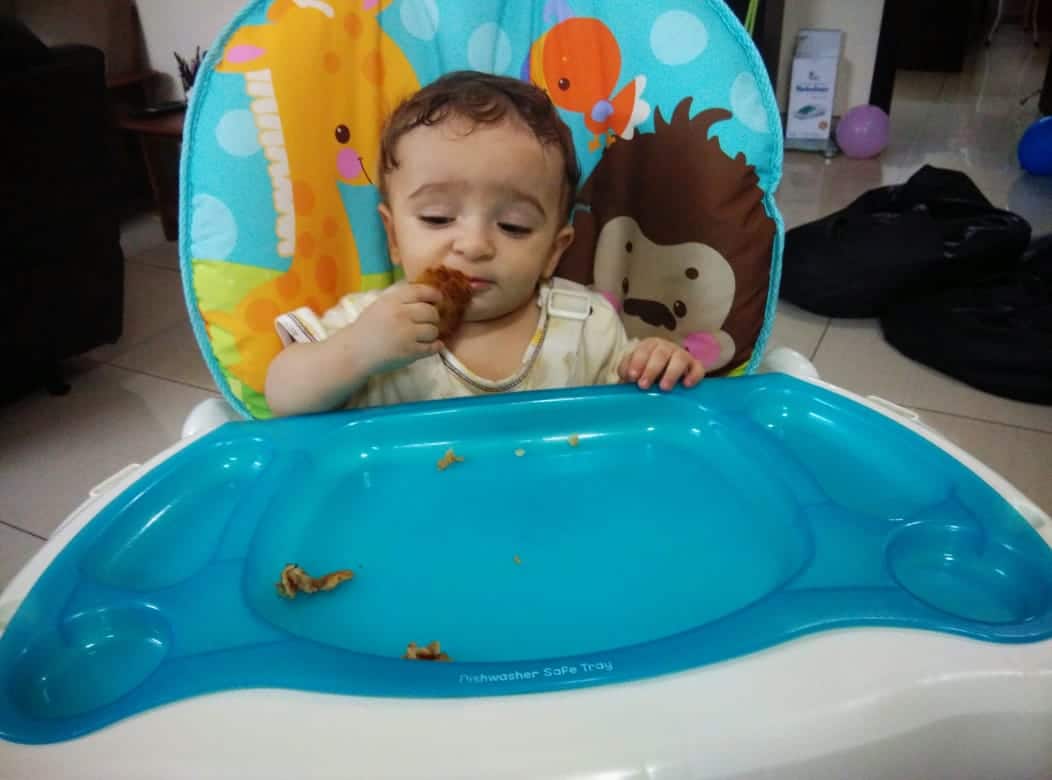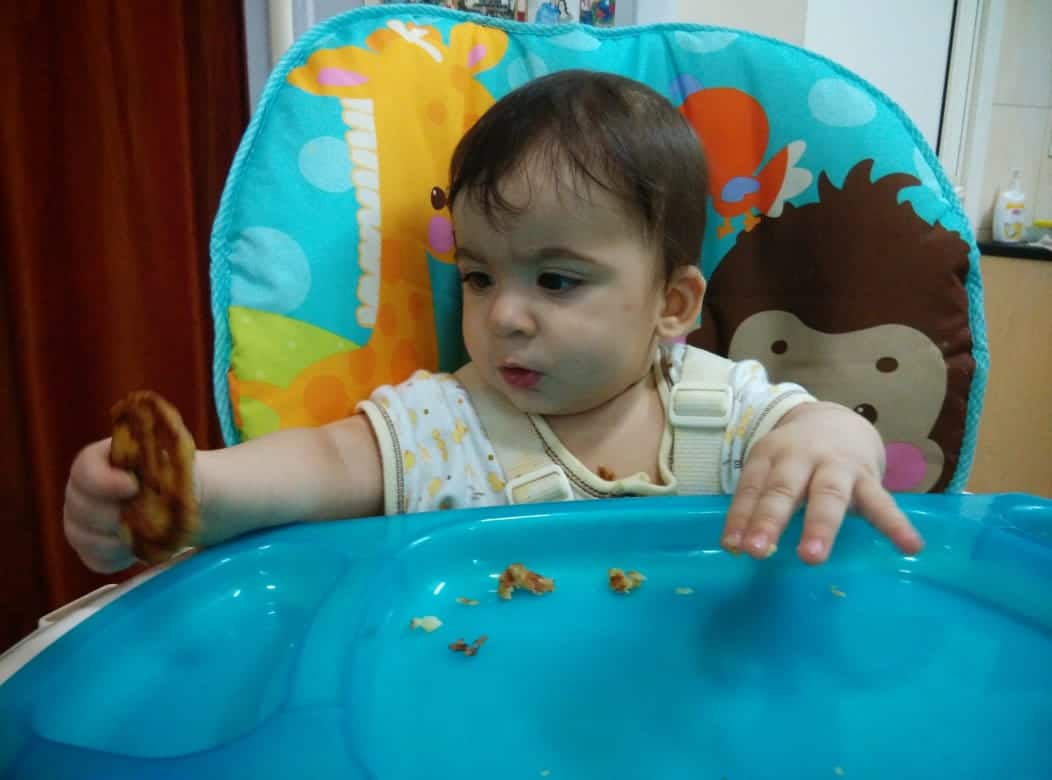One of the most tricky times for a parent is when they introduce solids to their child. By solids here I do not mean only solid food but anything other than mother’s milk or formula. The process is commonly referred to as weaning. This is a period that overwhelms most mothers because they are inundated with rules and advice from all around. Be it doctors (and every pediatrician seems to have their own set of weaning rules), experts, family, friends, neighbourhood aunties with their old wives tales and of course the bombardment of advertising from ‘baby food’ manufacturers.
Like most mothers, I too went through a lot of anguish and anxiety while introducing solids to Adhyant and Nirbhay. I did some things right (like offering healthy homemade food), made plenty of mistakes (like continuing with purees for far too long and resorting to distraction) before I learnt my lessons and corrected my errors. To save parents (who are in the process of weaning their little ones) the stress, I’ve listed out and explained my top 12 guidelines. These are all based on science and evidence and not hearsay. Please save and share with friends and family who will find this useful.
1. Don’t introduce solids before six months
A baby should be on only breastmilk or formula till 6 months of age. Don’t introduce solids or any other liquids before that. No cereal, no water, no animal milk, no ghutti – nothing.
2. Start solids when baby shows all signs of readiness
A baby is ready to start solids when –
- They can sit unassisted
- They have lost their tongue thrust reflex
- They show an interest in adult food and can communicate satiety. Communication at around the 6 month mark is usually in the form of shutting their mouth, turning their head away etc.
3. Food before one is just for fun
Till a baby is one year, milk (either breastmilk or formula) should be the main source of nutrition. Milk feeds should not be dropped in favour of solids. Offer breast before other foods till 12 months. Breastfed babies should be nursed on demand till they are one-year-old. Non breastfed babies should be offered at least 500 ml of formula per day until 12 months of age.
4. Offer, dont force
Your job is to feed nutritious food. Your baby’s job is to eat as much as they want. Feed baby in an upright position. No force feeding and no distraction.
 5. There are two different ways to wean
5. There are two different ways to wean 
Traditional Weaning – This means introducing solids with purees, porridge, mashed and semi-solid food in the beginning and gradually moving on to family food.
Baby-led Weaning – This means baby eats what the family eats. Baby is offered normal food (no mashed food or purees) and eats on their own. No spoon feeding and the baby eats because they want to.
6. Slow and steady
Start with small amounts of solids and gradually increase quantity offered. Solids for a baby are Complementary foods which are meant to complement Breast milk or formula and not replace it. By 1 year a baby should be eating family meals with a focus on food rich in calories, iron and Vitamin A. Always encourage self feeding.
7. Offer high calorie food
Babies need high calorie food because in their first year they grow more quickly than at any other time in their life. That’s why when cooking for babies, it is advised to drain well to avoid filling the babies with water. So no dal water or rice water. Watered down food has minimal nutrition. It just fills up the tummy without providing any calories and also displaces nutrient rich breastmilk or formula.
8. Milk rules
- No cow’s milk till 12 months as main drink. Small amounts can be used in food preparation. The excessive protein load in cow’s milk can also overload a baby’s kidneys. It is harder to digest as well and can cause intestinal blood loss and contribute to the development of Diabetes.
- Continued breastfeeding till 2 years or beyond. After 1 year, solids become the main source of nutrition so should be offered before breast milk.
- Formula fed babies should be weaned off of formula (and bottles) around the one year mark.
- Children above 1 year should have not more than 350-400 ml of animal milk per day. This includes all dairy items like cow’s milk, cheese, paneer, curd, buttermilk. Reason being – it leaves little room for other nutrient rich foods and can interfere with the body’s iron absorption.
9. Babies can eat without teeth
Baby does not need processed food or watered down purees. Baby already has strong teeth under their gums and can hence easily manage thick purees, porridges and other normal solid food.
10. Some NO-NOs
No salt, sugar or honey in the first year. Avoid juices.
- Babies do not need salt. Their bodies need less than 1g of sodium a day which they get from breast milk or formula. Beyond that their kidneys cannot handle or process more salt. Any extra salt can lead to kidney problems and a whole host of other diseases later in life.
- Babies do not need sugar. Babies will prefer sweeter foods and the earlier you introduce added sugar, the more likely it is that your child will develop a habit of opting for sugary foods. Children who consume too much sugar are more prone to cardiovascular disorders, diabetes and other diseases. Sugar can also cause cavities and tooth decay and white sugar is heavily refined with chemicals.
- Do NOT give your child honey before 1 year. Honey can contain the spore of a bacteria that can cause Infant Botulism which can be fatal.
- Steer clear of fruit juices. Even homemade fruit juices are stripped of fibre and contain only the sugar part of the fruit. It’s basically empty calories with no nutrition and displaces BM or formula. Even when offered to toddlers it should only be occasional and can be diluted with water to lower the sugar content.
Choose homemade over store bought
Commercial baby foods contain too much sugar even when branded as savoury. Most packaged baby food is highly processed food, devoid of adequate fibre, full of added poor quality minerals and vitamins (that are artificially added after stripping the base product of its natural nutrients) that may not even be absorbed.
On the other hand, you have full control over home made food. Offer your baby home made fresh and nutritious family food (before adding salt/sugar/chilly to yours) and use this opportunity to start eating healthier yourself in the bargain.
Allergen advice
The most common food allergens are Peanuts, Tree Nuts, Animal milk, Soy, Eggs, Fish, Shellfish, Gluten (wheat, barley, rye, oats) and Citrus. The most recent research shows that introducing these foods early on lessen the occurence of allergies. However, if there is a family history of a particular allergy or any other health issue then introduce under the guidance of your doctor.
Earlier Posts in my Child Nutrition series:
The importance of a balanced diet for kids